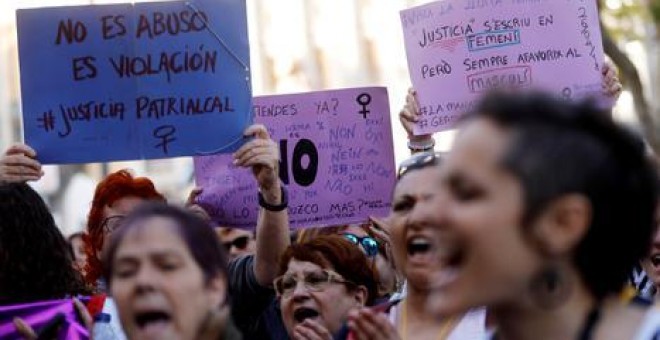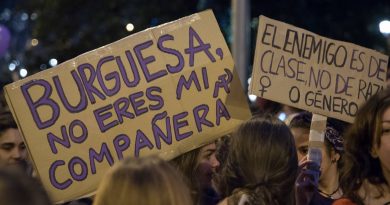Before the debate on the law "yes is yes", demagogic and inefficient
Shortly after the International Day for the Elimination of Violence against Women, a controversy was opened after the entry into force of the law called "yes is yes". Approved in October and promoted by the Minister of Equality Irene Montero (United we can), the objective of said law is to protect women from sexual assaults. Nevertheless, a part of its articles in fact allows the release or reduction of sentences for some rapists and pedophiles.
From The Pack
The Organic Law of Comprehensive Guarantee of Sexual Freedom was promoted before the social mobilizations after the first sentence to La Manada de Pamplona, who "sentenced" the defendants for sexual abuse and not for aggression. Faced with rejection in the streets, The Supreme Court had to rectify its decision and raised the penalties considering that what happened in the Sanfermines of 2016 It was a violation. Then the Ministry of Equality promoted the new law considering any non-consensual sexual act, with or without violence, how aggression. A) Yes, the figure of abuse disappears from the Penal Code.
Previously, cases were divided into sexual abuse if there is no violence or intimidation, Y sexual assault if there are. The new law typifies only sexual assault, whether or not there is violence and intimidation. A) Yes, previous penalties for abuse basic were from one to three years in prison and from four to ten years for the aggravated type. There was no reduction in sentences because a new crime is typified, which is equivalent to the old abuse: one year in prison for the basic type and four if it is aggravated. same as now.
Today's sorrows
By unifying in one the crimes of abuse Y aggression, the minimum penalties of abuse now they are integrated into the crime of aggression. That is to say, the reform does not imply an automatic reduction of sentences, how they misinterpret some recent sentences, abstractly and without considering all the circumstances. It is not the same crime with lower penalties, but a different one. Whatever, the judges are handing down sentences in favor of the convicted, in fact there is already 200 who have been favored with reductions in sentences under the law itself.
All against all
- Days ago, when the debate arose over the reductions in sentences that are requested under the new law, Montero accused the judges of “lack of gender training”, “machismo” Y "an incorrect application of the law”.
- The government of Pedro Sánchez has decided for the moment not to touch the law and wait for the courts, in particular the Supreme, establish a position on the cases in which a sentence reduction is requested. Seeks to appear in tune with the application of the law and bets that the issue will calm down.
- In turn, the State Attorney General's Office prepares a "harmonization of criteria", for which it has asked the prosecutors for judicial resolutions and their own reports. But the underlying problem remains because sexist violence does not stop.
Enough of patriarchal justice
One of the vertices of the problem is the gender and class nature of the judicial apparatus.. It is a reactionary institution, pillar of the '78 regime inherited from the Franco regime, at the service of capitalism, patriarchal and dependent on political power. with exceptions, in gender causes revictimizes the victims and is functional to the violent.
The new law is a partial advance in terms of rights for women, since it penalizes any act against the sexual intimacy of a person without their consent. Anyway, at the time of drafting the articles, feminist organizations were not consulted, which would have avoided ambiguities and omissions.
But apart from your application problems, a change only at the legal level is obviously insufficient to prevent and punish gender violence, prevent femicide and adequately assist its victims. And as with other crimes, hardening penalties does not solve the problem by not attacking its causes.
Our proposals
- one is needed judicial reform radical. Judges Choice, judges and prosecutors by popular vote, on a date separate from the political elections, with limited and revocable terms, and specialized gender prosecutors. Also implement trials by popular juries with gender parity. That is to say, a root change in justice, as part of a comprehensive institutional democratization.
- Refering to prevention of the abuses, discrimination and other sexist violence, Comprehensive Sexual Education is key from early childhood. But it is not enough that it appears in the law: it is necessary that the government allocate the necessary budget so that it is applied in all schools, to train teachers and for massive awareness campaigns.
- Refering to assistance to victims of violence, it is necessary to open enough foster homes, ensure free legal and psychological help, and other devices. The UN Commission on Human Rights recommends a minimum of one shelter for 10 places for each 30.000 population. And there is a need for social and housing reintegration subsidies for women and their daughters and sons, to achieve autonomy from the violent.
The 25N to win the streets
The next Friday 25 of November, the feminist movement and with popular support we have to win the streets again, against all types of gender violence and for all the rights that still owe us.
The solution to the paradox posed by the new law will not come from this justice nor from the anti-feminist bourgeois politicians. It will be the street mobilization, together with a democratic consultation to the organizations of the feminist movement on each step and legislation that involves them. Everything in the way of continuing to face this capitalist and patriarchal system, father of all violence.




